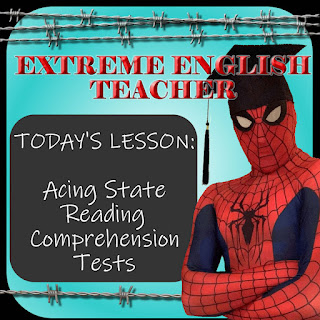The following was used in an AP Lit class, but can be used for any class that has a multiple choice test to prepare for.
We all know the best method of answering multiple choice tests is through process of elimination, but we also know that students often skip to trying to jump to the correct answer. That's great if the correct answer is obvious to them, but not so good if they don't see it right away and often leads to poor decision making.
In AP Lit, the multiple choice questions are quite the bear to get through. Most prep guides say to shoot for 60% correct. The kind of kid who is attracted to an AP course does not shoot for 60% and has a hard time dealing with that concept. We do A LOT of multiple choice practice, so I am always thinking about how to do it differently.
Today I tried reverse process of elimination. In order to do that, I needed the following items:
- A multiple choice practice passage (just one passage - not a whole slew of them because this will take too long) - the passage I choose was from the Princeton Review AP English Literature and Composition Prep Guide 2023. I like this book because the multiple choice are, in my opinion, harder than the College Board ones. Hopefully, they build up to these and when they see the actual test, they will feel a bit more confident.
- An answer document formatted to fit the activity. I used Fireworks to make it. You can take mine and alter it to fit your needs or make a new one. I'll put the image below. It's formatted oddly because you need the hole punch to reach the answer bubbles.
- Single hole punchers - a week ago, I offered a grammar pass for every hole punch that was donated to the cause. I now have more than I'll probably ever need.
- Red and black markers
Here's the process. I mark my answer sheet by coloring in all the wrong answers with my red marker and all the correct answers with my black marker. Students get an answer sheet, practice passage, and hole punch and get to work. After reading the passage, they punch out one answer bubble for each of the questions. The goal here to to punch out a WRONG answer. This is an answer they are eliminating.
Then it is brought up to me where I will lay it over my answer key. When I see red, I make a red mark on that bubble (well, the paper surrounding the now vacant bubble). When I see black, I mark it and then mark out all remaining answer choices in that question. The students get the answer sheet back and get to try again for all questions that have not been blacked out. This process is repeated up to four times (since there are only 5 answer choices).
When it is finished, for these ten questions, I chose to give them a 25 base grade and then 2 points for every red mark. Top grade for that would be a 105. It looks like this:
That's my key to the left (rather messy after two periods of marking answers) and a finished answer sheet to the right. I just count the red marks, times by two, add 25 and voila!
This takes about an hour to do, with some students finishing earlier than others (they had homework they could get started on). For slow working students, this does increase the amount of time they use considerably, but not enough to cause any problems for me today.
Afterwards, they said it was much more stressful, but they felt it really drove home the process of elimination. They also felt that the last two attempts were easier since they had less answer choices to choose from (which is the point of process of elimination anyway).
Do you have an interesting way to shake things up with multiple choice? Let me know in the comments!






























